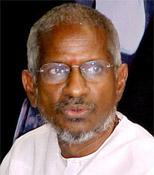
He was born as Gnanadesikan aka Rasaiya, the third son to parents Ramasamy and Chinnathayi on 2nd June 1943 in Pannaipuram, near Madurai, Tamil Nadu. Music was in his blood even from childhood and it was his brother Paavalar Varatharasan who encouraged this talent to its maturity.
Rasaiya and his brother had a music troupe and they conducted many programmes throughout Tamil Nadu during 1958 to 1968. In 1968, he came to Chennai to learn music. In 1970, he appeared for the examination of the Trinity college of Music, London in Classical Guitar and came out with a Gold Medal. Simultaneously he had his grounding in Indian classical music. During this early years in Chennai he also learned Western Music from Dhanraj Master. It was Dhanraj Master who re-christened him as Raja. After acquiring knowledge in Music, he tried his luck in the film industry and got an opening through the Tamil film director Panju Arunachalam for his film 'Anarkali' in 1976. Panju Arunachalam not only gave Raja the entry ticket to the tinsel world but also an exciting name- Ilaiyaraaja. From then on there was no looking back and Ilaiyaraaja went on to script a success story in South Indian Film music.
Since 1976, in a career spanning over 3 decades, he has completed over 840 films and composed over 5000 songs in various Indian languages like Tamil, Telugu, Malayalam, Kannada, Hindi and English . In the early 80's he used to produce music for at least 40 movies per year, some of them running 100 days just for the sake of the music alone. Raja has worked mostly with singers SP Balasubramaniam, S.Janaki, Chitra, Jesudas providing much of the music that defined their reputation.
His hits include songs from movies like 16 Vayathinilae, Sindhu Bhairavi, Anjali, Azhagi, Bharathi, Chinna Thambi, Dalapathi, Devar Magan, Guna, Hey Ram, Mouna Ragam (Tamil), Sadma, Lajja (Hindi), Olangal, Moonnam Pakkam, Kaalapaani, Achuvinte Amma, Kochu Kochu Santhoshangal (Malayalam) and many more...
Besides composing movie songs, he has many background tracks for movies and non-film albums including devotional and instrumental albums to his credit. Notable among them is Vedic Chants (a rendition of the Vedas by an eight year old girl), Gitanjali, Raajavin Ramana Maalai, Ilayarajavin geethavazhippaadu etc. He is highly spiritual and has composed many devotional songs on Ramana Maharshi, Saadhu Sri Raam Surat Kumar (Visiri Saamiyaar). He was one among the few composers who attempted unique styles in folksy tunes.
He had credited a truly unique orchestration technique, which involves blending of western and Indian instruments. He is the first Asian to compose a full symphony with the Royal Philharmonic Orchestra (RPO) of London under the baton of John Scott. He was hence called by the name 'Maestro' Ilayaraja.
Beside his career in film music he had written lyrics to fusion albums and as a part of his experimentation, he has tried blending western classical fusions with the traditional Indian music. The two famous fusion albums of his compositions are 'How to name it' and 'Nothing but wind'. The second album, 'Nothing but wind', features noted flutist Pandit Hariprasad Chaurasya. In this albums fusion has been explored and exposed in depth. His most recent work India 24 hours and Thiruvasakam in Symphony has added yet another feather to his cap. Thiruvasakam in Symphony an Oratorio of Thiruvasakam with Symphony orchestration.
He created a new raga by name 'Panchamukhi' of his own explaining the five facets of music. He is the only music director to compose a song in just 3 notes (swaras). During his on-stage Carnatic vocal performance, he sang his own 'Kirthanas'. Ilayaraja has also produced some movies under the banner Pavalar productions in remembrance of his brother.
Ilayaraja has received many awards for his contributions to the world of music. National Film award for Best Music direction three times for the films, Saagara Sangamam (Telugu 1984), Sindhu Bhairavi (Tamil1986) and Rudra Veena (Telugu 1989), Best Music Director award from the governments of Tamil Nadu, Kerala, Andhra Pradesh. 'Kalaimamani Award', an annual award for excellence in the field of arts, by the Government of Tamil Nadu (1988), Lata Mangeshkar Award for Excellence in Music from the Government of Madhya Pradesh(1998), Degree of Doctor of Letters by the Annamalai (1994) and Madurai Kamaraja University, Tamil Nadu (1996), Cultural Doctorate in Philosophy of Music by the World University Round Table, Arizona, U.S.A(1994) and many more. In 2002, his composition 'Rakkama Kaiya Thattu' from the movie Dhalapathi was the No.1 in BBC World Service Top Ten with more than 50% of the votes. He was the music composer for the Miss World 1996 Pageant, held at Bangalore.
Besides composing music, Raja loves photography and writing poetry. He is married to Jeeva and the couple have three children ( Sons Karthik Raja and Yuvan Shankar Raja and daughter Bhavtharini). Following the footsteps of their father, all of them are music composers and his daughter is also a play back singer. Raja's brother Gangai Amaran is also a composer and song writer.



1 comments:
thank you sir,
View blog reactionsI didnt miss single word, in this article of yours, bcoz, its all about Indian GOD of MUSIC- IlayRaaja..
I listen to music, only to his composititions..,as they're so true,they're so natural,they've the feel, they've the souls...
Thanks a lot sir..
Regards,
Vinnie
Post a Comment